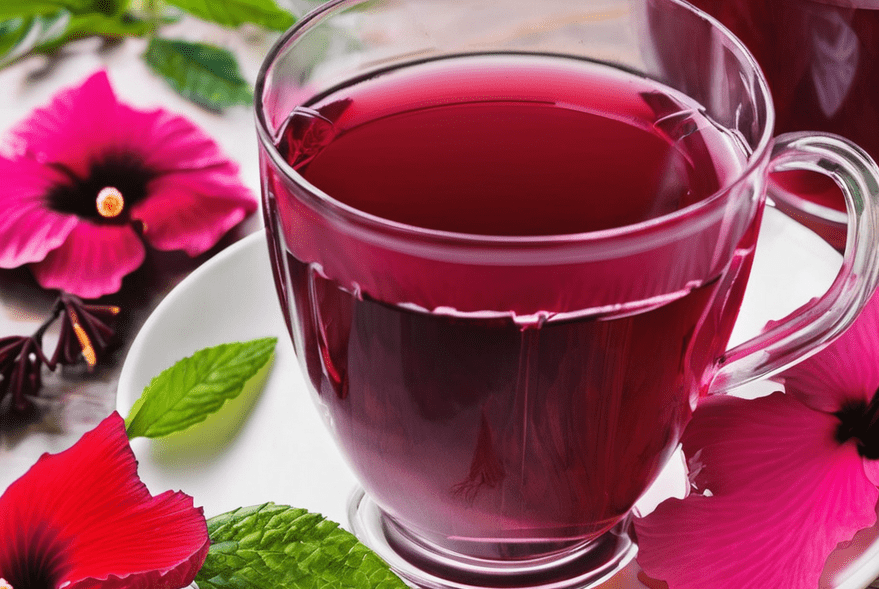
16 Hibiscus Tea Benefits and How to Take it
Hibiscus tea is an herbal infusion made from the dried petals of the hibiscus flower, specifically Hibiscus sabdariffa. It has a long history in various cultures, particularly in Africa, the Caribbean, and Central America.
Known for its deep red color and tart flavor, hibiscus tea is often referred to as “sour tea” in some cultures. This herbal tea is not only a delicious beverage but also a powerhouse of health benefits. This article will explore 16 amazing health benefits of hibiscus tea. In addition, we will also discuss how to take it effectively…Click Here To Continue Reading>> …Click Here To Continue Reading>>
Nutritional Profile of Hibiscus Tea
Hibiscus tea is low in calories and packed with nutrients that contribute to its health benefits. Here’s a detailed nutritional profile for a typical serving (one cup) of hibiscus tea:
| Nutrient | Amount per Serving | Daily Value (%) |
|---|---|---|
| Calories | 0-5 | 0% |
| Vitamin C | 0.6 mg | 1% |
| Calcium | 2 mg | 0% |
| Iron | 0.1 mg | 1% |
| Antioxidants | High levels of anthocyanins and polyphenols | N/A |
These nutrients play crucial roles in maintaining overall health. Vitamin C supports immune function, while antioxidants help protect against oxidative stress. Additionally, hibiscus tea contains organic acids that may aid in digestion and promote heart health.
16 Amazing Hibiscus Tea Health Benefits
1. Rich in Antioxidants
Hibiscus tea is loaded with antioxidants, particularly anthocyanins, which give the tea its rich red color. Antioxidants are crucial in combating oxidative stress in the body. This can lead to chronic diseases such as heart disease, diabetes, and cancer.
Plus, The presence of these compounds helps neutralize free radicals. Regular consumption of hibiscus tea can help protect your cells from this damage, promoting overall health and longevity.
A study published in the Journal of Nutrition found that hibiscus extract significantly increased antioxidant levels in participants’ blood. This highlights its potential as a natural source of antioxidants. This protective effect can be particularly beneficial for individuals exposed to environmental toxins or those with high-stress lifestyles.
2. Supports Heart Health
Drinking hibiscus tea may contribute to heart health by lowering blood pressure and cholesterol levels. Studies have shown that hibiscus can significantly reduce systolic and diastolic blood pressure in individuals with hypertension.
For example, a study published in The Journal of Nutrition found that participants who consumed hibiscus tea daily experienced a notable decrease in blood pressure after just six weeks.
Additionally, it may help lower LDL cholesterol levels (the “bad” cholesterol) while raising HDL cholesterol (the “good” cholesterol). This makes hibiscus tea an excellent choice for those looking to improve their heart health naturally.
Moreover, the anti-inflammatory properties of hibiscus can further enhance heart health by reducing inflammation within blood vessels. This potentially lowers the risk of heart attacks or strokes.
3. Aids Digestion
Hibiscus tea can aid digestion due to its mild laxative properties and ability to promote healthy digestion by increasing urine production and acting as a diuretic. This herbal infusion can help alleviate symptoms of constipation and bloating.
Moreover, hibiscus contains organic acids that may enhance the secretion of gastric juices, aiding in the breakdown of food and improving nutrient absorption. Hibiscus tea could be especially beneficial for those who struggle with digestive issues.
Additionally, drinking hibiscus tea after meals may help reduce feelings of fullness or discomfort. This makes it an ideal post-meal beverage!

4. Helps with Weight Management
For those looking to manage their weight, hibiscus tea can be a helpful addition to your diet. Some studies suggest that hibiscus extract may inhibit the absorption of starch and glucose. This potentially aids weight loss efforts by reducing fat accumulation.
One study indicated that participants who consumed hibiscus extract experienced a decrease in body weight and body fat percentage.
Additionally, hibiscus tea is low in calories and can be a satisfying alternative to sugary beverages. This makes it an excellent choice for those aiming to reduce calorie intake while enjoying a flavorful drink.
Plus, Incorporating hibiscus tea into meal plans can provide hydration without added sugars or calories. This helps people feel fuller longer without compromising their dietary goals.
5. Boosts Immune System
The high vitamin C content in hibiscus tea supports the immune system by helping your body fend off infections and illnesses. Vitamin C is known for its role in enhancing the production of white blood cells—essential for fighting off pathogens.
Regular consumption of hibiscus tea can enhance your body’s natural defenses. This is especially true during cold and flu season when your immune system needs extra support. Furthermore, the antioxidants present in hibiscus also play a role in reducing inflammation.
By incorporating this herbal infusion into your daily routine, you may experience fewer colds or infections throughout the year!
6. Regulates Blood Sugar Levels
Hibiscus tea may help regulate blood sugar levels. Some studies indicate that hibiscus extract can lower blood sugar levels and improve insulin sensitivity. This is crucial for managing diabetes effectively.
Research demonstrated that participants who consumed hibiscus extract experienced significant reductions in fasting blood sugar levels. This makes hibiscus tea a valuable addition to the diets of individuals looking to maintain stable blood sugar levels.
Additionally—by helping regulate insulin response—hibiscus may also assist with cravings. This makes it easier for people to manage their weight alongside diabetes!
7. Promotes Liver Health
Research suggests that hibiscus tea may have protective effects on the liver. It has been shown to reduce liver inflammation while promoting liver function by increasing the production of detoxifying enzymes.
A study found that hibiscus extract could help prevent liver damage caused by toxic substances while improving liver function markers among participants with fatty liver disease. This showcases its potential as an effective natural remedy for supporting overall liver health!
Furthermore, hibiscus can also aid people recovering from alcohol-related liver issues.

8. Enhances Skin Health
The antioxidants found within hibiscus tea also benefit skin health by combating signs of aging while promoting a youthful appearance! Hibiscus can help improve skin elasticity and hydration due to its high content of vitamins A & C. They are essential for maintaining healthy skin.
Plus, Drinking hibiscus tea regularly can also help reduce acne breakouts while minimizing fine lines & wrinkles! Additionally—many skincare products now incorporate extracts from this flower due to their anti-aging properties!
For those seeking natural skincare solutions—you can use brewed cooled-down hibiscus tea as a facial rinse. Its soothing properties could provide additional benefits on top of regular consumption!
9. Reduces Anxiety and Stress
Hibiscus tea has natural calming properties that may help reduce anxiety & stress levels! The act of sipping warm herbal teas itself can be soothing—it creates moments of mindfulness amidst busy days filled with responsibilities!
Certain compounds within this flower may promote relaxation. It can influence neurotransmitters associated with mood regulation. This offers potential benefits for mental well-being without side effects often linked with pharmaceutical options!
You can enjoy a cup before bedtime; many find that this ritual helps ease them into restful sleep while relieving tension accumulated throughout their day!
10. Supports Menstrual Health
For women experiencing menstrual discomfort—hibiscus tea can provide relief due to its anti-inflammatory properties! It may help alleviate cramps while regulating menstrual cycles through balancing hormones via potential effects on estrogen levels within the body.
Drinking this herbal infusion during menstruation can be both soothing & beneficial. Many women report reduced pain levels when consuming it during their periods! Additionally—the hydration provided by this beverage could combat fatigue associated with menstruation!
Including this delightful drink during those challenging days might just make them more manageable!
11. Improves Hair Health
The vitamins & minerals found within hibiscus tea promote healthy hair growth & scalp health due to their nourishing properties! This makes it an excellent choice for those looking to enhance their hair care routine naturally!
Hibiscus is often used in hair care products due to its ability to strengthen hair follicles while preventing premature graying through rich nutrient profiles. Plus, Drinking this herbal infusion regularly may lead to shinier healthier locks while also providing hydration from within!
You can use brewed cooled-down hibiscus water as a part rinse after shampooing. Many find it enhances shine while adding moisture back into dry strands!
12. Acts as a Natural Diuretic
Hibiscus acts as a natural diuretic—helping increase urine production while flushing out excess fluids from the body! This can be particularly beneficial for individuals experiencing water retention or bloating after meals—or during certain times of menstrual cycles!
However, it’s important not to overconsume this herb since excessive intake could lead to dehydration if not balanced with adequate water intake. Moderation remains key here; You can enjoy two to three cups daily should suffice without adverse effects!
13. Provides Anti-Inflammatory Benefits
The anti-inflammatory properties found within this herbal infusion make it effective at reducing inflammation throughout the body! Chronic inflammation has been linked to numerous health issues—including arthritis & other chronic pain conditions. So incorporating anti-inflammatory foods like these into diets could prove beneficial long-term!
Studies suggest regular consumption may alleviate symptoms associated with inflammatory diseases. This can provide relief without solely relying on pharmaceuticals! For people suffering from conditions such as rheumatoid arthritis—the inclusion might offer additional support alongside traditional treatments!
14. May Help Prevent Cancer
Some studies suggest antioxidants present within this herbal infusion might possess potential anticancer properties. It can inhibit cancer cell growth while promoting apoptosis within specific types of cancer cells!
While more research is needed regarding these claims—hibiscus could potentially offer protective benefits against cancer over time! Plus, you’re not only treating yourself but also investing towards long-term wellness goals!

15. Supports Healthy Blood Pressure Levels
In addition to lowering high blood pressure—hibiscus may also help maintain healthy readings among people already possessing normal levels! This makes it an excellent beverage choice for those looking towards long-term cardiovascular health!
Regularly enjoying this herbal infusion as part of one’s daily routine provides ongoing support toward maintaining optimal blood pressure without solely relying on medications!
You can consider pairing it with other lifestyle changes such as exercise & balanced diet to further enhance results.
16. Refreshing Hydration Option
Hibiscus tea isn’t just nutritious but incredibly refreshing too! Whether served hotly or iced—it offers a unique tart flavor that many enjoy as an alternative beverage option compared to sugary drinks plain water!
Staying hydrated is essential for overall health. Plus, Adding delightful herbal infusion into one’s routine makes hydration more enjoyable while providing numerous benefits simultaneously!

How to Take Hibiscus Tea Effectively
To maximize its effects and enjoy it to the fullest, here are some effective ways to prepare and consume hibiscus tea:
1. Choose Quality Ingredients
To make the best hibiscus tea, start with high-quality dried hibiscus flowers or fresh petals. Look for organic options to ensure they are free from pesticides and chemicals. The quality of the water you use is also essential; filtered water is recommended as it enhances the flavor of the tea.
2. Preparation Methods
There are several methods to prepare hibiscus tea, each offering unique flavors and experiences:
Hot Hibiscus Tea:
- Boil Water: Use an electric kettle or stovetop to bring water to a boil (around 208°F).
- Warm the Teapot: Pour some hot water into your teapot to warm it up, then discard the water.
- Steep: Add about 1-2 tablespoons of dried hibiscus flowers per cup of boiling water. Cover and steep for 5-7 minutes.
- Strain and Serve: Strain the flowers and pour the tea into your cup. Sweeten with honey or sugar if desired.
Iced Hibiscus Tea:
- Cold Brew Method: Place dried hibiscus petals in a pitcher filled with cold or room-temperature water. Let it steep in the refrigerator for at least 4 hours or overnight for a more robust flavor.
- Strain and Serve: Strain out the petals before serving over ice. Sweeten as preferred.
Quick Iced Tea:
Boil water and steep dried hibiscus flowers for about 10 minutes. Let it cool slightly, then pour over ice. Sweeten while still warm for better mixing.
3. Adjusting Flavor and Sweetness
Hibiscus tea has a naturally tart flavor, which can be enhanced or mellowed based on your preferences:
- Sweeteners: Add honey, agave syrup, or sugar to taste. For iced versions, use simple syrup for easier mixing.
- Citrus Twist: A squeeze of lime or lemon juice can brighten the flavor and add a refreshing twist.
- Herbal Mix-ins: Consider adding spices like cinnamon sticks during steeping or fresh mint leaves for an aromatic touch.
4. Optimal Serving Temperature
Hibiscus tea can be enjoyed both hot and cold, depending on your mood and the season:
- In colder months, serving it hot can provide warmth and comfort.
- During warmer months, iced hibiscus tea is incredibly refreshing and hydrating.
5. Timing Your Consumption
To reap the health benefits effectively:
- Before Meals: Drinking hibiscus tea before meals may aid digestion and help regulate blood sugar levels.
- As a Hydration Source: Replace sugary drinks with hibiscus tea throughout the day to stay hydrated without excess calories.
- Evening Relaxation: YOu can enjoy a cup in the evening as part of your wind-down routine; its calming properties may help reduce stress.
6. Dosage
You should aim for about 2-3 cups per day—this amount has been shown effective without significant risks.
Risks and Side Effects
While hibiscus tea offers plenty of health benefits, there are some potential risks associated with its consumption:
- Blood Pressure Effects: Hibiscus has been shown to lower blood pressure significantly. Thus people with hypotension should consume it cautiously.
- Pregnancy Concerns: Pregnant women should avoid drinking hibiscus tea. This is due to potential emmenagogue effects which could stimulate menstruation.
- Drug Interactions: Hibiscus may interact negatively with certain medications such as those used for diabetes or hypertension. You should consult with healthcare providers before consumption.
- Allergic Reactions: Some people might experience allergic reactions including itchy eyes or respiratory issues after consuming hibiscus products.
- Liver Toxicity: In extremely high doses, there are concerns regarding liver toxicity. However such doses would likely be difficult to achieve through normal dietary intake.
FAQs
1. What does hibiscus tea taste like?
Hibiscus tea has a unique flavor profile that is often described as tart and slightly fruity, similar to cranberry or pomegranate. Its vibrant red color and refreshing taste make it a popular choice for both hot and iced beverages. Many people enjoy sweetening it with honey or sugar to balance its natural tartness.
2. Can I drink hibiscus tea every day?
Yes, most people can safely enjoy hibiscus tea daily. Consuming 2-3 cups per day is generally considered beneficial for health. However, individuals with low blood pressure, pregnant women, or those on certain medications should consult a healthcare professional before making it a regular part of their diet.
3. Is hibiscus tea caffeine-free?
Yes, hibiscus tea is naturally caffeine-free. This makes it an excellent choice for those looking to reduce their caffeine intake or avoid it altogether.
4. Where can I buy hibiscus tea?
Hibiscus tea can be found in most grocery stores, health food stores, and online retailers. Look for dried hibiscus petals or pre-packaged tea bags labeled as “hibiscus” or “sour tea.”
5. Can I use fresh hibiscus flowers to make tea?
Yes, you can use fresh hibiscus flowers to make tea! Just ensure that they are free from pesticides and chemicals. Wash the flowers thoroughly before using them in your tea preparation for the best flavor and safety.
6. Is hibiscus tea safe for children?
Hibiscus tea is generally safe for children in moderation; however, it’s always best to consult a pediatrician before introducing new herbal teas into their diet.
The post 16 Hibiscus Tea Benefits and How to Take it first appeared on Lagos Reporters.
Disclaimer: The information contained in this content is for general purpose only and is generated from different sources other than MenBills Colony. Kindly report any fake news or false statement to support@menbills.com.ng








Samuel4
on ‘My wife was pregnant for another man inside marriage’
27-09-2024 04:43:01am
Ishiro
on ‘My wife was pregnant for another man inside marriage’
23-06-2024 11:38:24am
Ishiro
on ‘My wife was pregnant for another man inside marriage’
23-06-2024 11:38:14am
Oladunni
on ‘My wife was pregnant for another man inside marriage’
22-06-2024 04:19:58pm
Candy100
on Man who made allegations against E-Money and late Junior Pope’s wife publicly apologizes
22-06-2024 08:02:49am
Candy100
on BREAKING: Kano Govt Makes Fresh Announcement Over Emir Sanusi Amid Tussle In Kano
21-06-2024 08:15:39pm
Candy100
on 2027: Obi gives condition for merger with PDP
21-06-2024 08:10:14pm
Candy100
on Hajj: Last set of FCT pilgrims to report at camp today
21-06-2024 08:09:27pm
Shakeerah
on BREAKING: Kano Govt Makes Fresh Announcement Over Emir Sanusi Amid Tussle In Kano
21-06-2024 08:40:05am